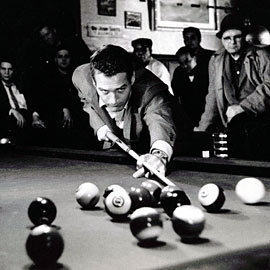Recommended Posts
billvon 3,179
Exactly. The opposite is a heavily regulated economy. Depending on how this is implemented it could be a socialist economy.
QuoteQuoteQuoteQuote>you can't just have 'economic' anarchy.
Sure you can. No financial regulations. You can still have a justice system for criminal matters (i.e. no armed robbery, no murder) but it can basically stay out of the financial system, and allow fraud, misrepresentation, anticompetitive practices, monopolization of industry, airwaves, airspace etc.
Not only can but did.
Here in the US just before the turn of the 20th century. They called them "Robber Barons".
Carnigie, Rockefeller, Brady, Fisk are the most famous (or notorious)
Also the "Big Four" that ran California after the transcontinental railroad was built.
that wasn't anarchy - that was capitalism. carnegie, rockefeller etc... were capitalists.
So what did Carnegie do that was so bad, other than giving away a whole lot of money?
QuoteCarnegie and one of his managers, Henry Clay Frick, were violently anti-union. In 1892, while Carnegie was in Scotland, Frick provoked a bloody strike when he demanded a pay cut and an end to the union at his Homestead plant in Pennsylvania. When the workers refused to accept Frick’s demands, he fired the entire work force and surrounded the plant with barbed wire and hired Pinkerton guards to protect the strikebreakers he brought in. Two barges carrying the Pinkerton guards were met by thousands of strikers and their friends and families, who kept the -guards from landing, in a battle that left twenty strikers dead. Stiffening his back, Frick called on the state governor to send in 7,000 militiamen to protect the replacement workers. During the four-month confrontation, a young anarchist named Alexander Berkman — the lover of “Red Emma” Goldman (1869-1940), the most notorious anarchist leader of the day — shot Frick in the stomach, but only wounded him, and he was back in his office that day.
After the militia arrived, strike leaders were charged with murder, but all were acquitted. The plant kept producing steel with workers shipped in by railroad, and other Carnegie plants failed to join the Homestead strike, a union defeat that kept labor unorganized in Carnegie plants for years to come.
http://hms.yarmouth.k12.me.us/Pages/teacher/YSD_HMSroco/socialstudies/gildedage/RobberBarons
blue skies from thai sky adventures
good solid response-provoking keyboarding
Quote>no, they would be examples of pure capitalism at work (they were more
>interested in their property rights than the rights of other individuals).
>anarchists were/are those opposing pure capitalists such as the 'robber
>barons'.
So you believe that anarchists were opposing the "real capitalists" by . . . getting governmental regulations passed to limit capitalism's excesses?
You and I have basically opposite definitions of "anarchist."
it seems we do...
QuoteA virtually ubiquitous trope, both in fiction and Real Life, is the misconception that anarchists have no beliefs, that anarchy is chaos. While anarchy and chaos are not mutually exclusive (chaos is anarchic, but anarchy is not necessarily chaotic,) such an un-mindset is properly called nihilism, the belief in nothing. Anarchism (A.K.A.: Egalitarianism, libertarianism) on the other hand, is (in negative terms) simply the belief that hierarchy is inherently unjust (as indicated in its Greek roots, an- [no] -arkhos [ruler,]) and that (in positive terms) freedom, equal rights and solidarity are great ideals. Incidentally, this is what the term 'liberal' originally meant, complete with chaotic image, as opposed to 'conservatives' that we would now call 'monarchists'.
This trope, admittedly, has been bolstered by the idea that society's existence is somehow contingent on that of top-down leadership, but also because of the "propaganda by the deed" violence some anarchists about a century ago perpetrated against the robber barons of the gilded age. While not diminishing the terrorism that occurred, anarchists reject the notion of their belief meaning or necessarily resulting in violence. Anarchists advocate opposition to oppressors and their instruments, but in nearly all cases seek to peacefully produce a democratic and voluntary government in their stead. There are in fact whole branches of anarchism, such as anarcho-pacifism and Christian anarchism, to whom violence is utterly unacceptable.
In the USA, “Anarchist” tends to call up images of Nietzsche Wannabe Dirty Commies or Bomb Throwing Anarchists and “Libertarian” tends to call up images of Crazy Survivalist Rednecks or Darwinist Corrupt Corporate Executives. Worldwide, “Libertarian” and similar terms gravitate to the same meanings as “Anarchist” does stateside.
Predictably, anarchists have historically been the target of brutal persecution from both capitalist and socialist authoritarians, due to their belief that both are wrong in their domineering ways. Note, however, that both capitalist and socialist anarchists also exist, who revile each other just as much as any other factions of such do.
http://tvtropes.org/pmwiki/pmwiki.php/Main/AnarchyIsChaos
blue skies from thai sky adventures
good solid response-provoking keyboarding
TomAiello 26
Quotethey would be examples of pure capitalism at work...
they were hijacking government power to their own private ends
(when government power is used to promote private ends, isn't that fascism--not capitalism?)
Tom@SnakeRiverBASE.com
SnakeRiverBASE.com


.thumb.jpg.4bb795e2eaf21b8b300039a5e1ec7f92.jpg)
Unbridled capitalism is economic anarchy.
Share this post
Link to post
Share on other sites